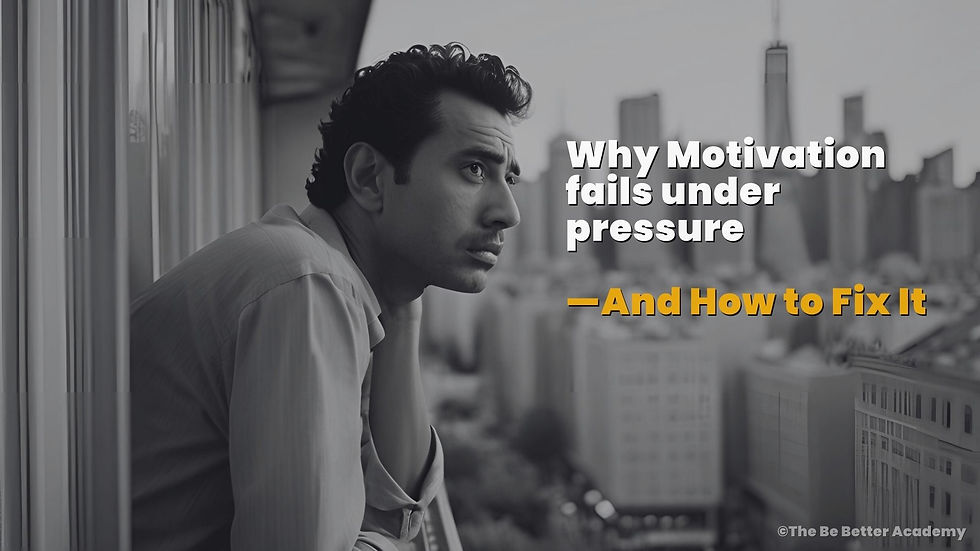Why Discipline Isn’t Your Problem. Mental Load Is
- Oliver Bukasa

- Apr 22, 2025
- 3 min read

You’re still disciplined. You haven’t lost your edge. You’ve just lost the space to use it.
You’re showing up to training. Doing the work. Following the program. On paper, everything’s in motion. But something feels off. You’re slower to react. Less confident in the moment. The mental sharpness you usually rely on? It’s not gone. It’s just buried under constant pressure.
This is the hidden cost of being a high performer in a high-pressure environment.
You’re not lazy. You’re not undisciplined.
You’re just overloaded.
And no amount of motivational quotes, pre-game rituals or hustle will fix it; not if you’re not managing your cognitive load.
Let’s break down what’s actually happening and how to get your clarity back..
You're Not Falling Off. You're Carrying Too Much.
In training, when the stakes are low, you’re fluid. Focused. Your movements feel clean, automatic.
But under the lights - in competition, under scrutiny, or with expectations hanging over you; things get heavier. You grip tighter. You think more. You try harder.
And ironically, that’s often when your performance dips.
I’ve experienced it. And I see it with the athletes I work with. They’re not underprepared. They’re just mentally carrying too much.
That’s the real culprit: mental overload.
The Real Problem: Cognitive Load
We talk about burnout, decision fatigue, overtraining, but under all of it is a mechanism that most athletes aren’t taught to manage: cognitive load.
Cognitive Load Theory (CLT), developed by psychologist John Sweller, explains how the brain processes information under pressure. Your working memory (the part responsible for decision-making, problem-solving and reacting in real time) has a limited capacity.
Western Sydney University explains it best: your working memory can only juggle a handful of inputs at any one time. When you exceed that capacity, things break down.
Think of it like dribbling a ball. One hand? Easy. Add a second ball? Still doable. But introduce a third, then a fourth, and your rhythm collapses. Not because you’re unskilled, but because your system is overloaded.
Same with your mind.
Why Athletes Are Especially Vulnerable
High-performing athletes are conditioned to push. To grind. To absorb pressure and thrive under it.
But this can backfire.
When your identity is built around being the hardest worker in the room, you’ll take on more than you should. You’ll try to out-focus, out-train, out-hustle mental fatigue - without recognising that your performance isn’t just physical. It’s cognitive.
This shows up as:
Overthinking during gameplay
Slower decision-making in high-stakes moments
Second-guessing instinctual moves
Feeling like your mental energy is shot (even after a goodnight's sleep)
The truth? You’re not broken. You’re stretched thin.
If your mind is constantly processing game footage, feedback, strategy, self-talk, pressure, comparison, and future plans; of course you feel foggy. You’re not playing slow, you’re just overloaded.
How to Protect Your Mental Bandwidth
Mental sharpness is not simply grinding harder. It’s being intentional with what you let in and what you keep out. Here’s where to start:
1. Train What Matters Most
Not every drill, session or piece of advice deserves your full attention. Prioritise the work that leads to meaningful improvement, not just what looks good on paper.
Use a tool like the Eisenhower Matrix to prioritise:
Important & Urgent – Train or fix it now
Important but Not Urgent – Plan and schedule it
Urgent but Not Important – Get support or delegate (yes, this includes mental clutter from social media and outside opinions)
Neither – Drop it

Your best performances will come from living more in the “Important but Not Urgent” zone — where you’re training ahead of pressure, not reacting to it.
2. Reduce the Mental Clutter
You don't need to make every decision. Simplify routines. Eat similar meals. Pack your gear the night before. Keep your warm-up consistent.
The less you think about the trivial, the more mental energy you preserve for game time.
3. Outsource What You Can
Recovery plans, nutrition, scheduling - if you’ve got people in your corner, let them help. Don’t carry what someone else can.
Delegating isn’t weakness. It’s clarity.
4. Recover Like It's Training
Recovery isn’t a luxury. It’s a skill.
Whether it's breathwork, cold exposure, visualisation, or short device-free breaks. It’s about creating mental whitespace. And that’s where clarity lives.
Final Thought
You’re still disciplined. You haven’t lost your edge.
But if you want that edge to feel sharp again, don’t just manage your time. Manage your mental load.
That’s what the best do.
They don’t just train harder. They think clearer.
Until next time,
Oliver
Mental Performance Coach



Comments